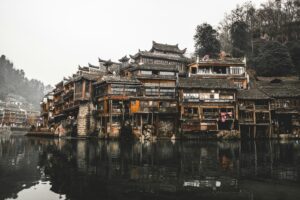The World Bank distributed nearly twelve billion dollars in loans, grants, and projects in 2023 alone. Countries like Bangladesh, India, and Indonesia received critical funds from the institution, funding much needed infrastructure goals and economic development – highlighting the underlying purpose of fighting poverty.
However, many have raised concerns about the effectiveness and necessity of the World Bank. After all, the funds it distributes are small compared to foreign aid and private investment. Developing countries also no longer lack the credit or financing channels like they did before. So what place does this development arm have in the modern world?
History and Function

In order to answer this question we must first explore the history of the World Bank. Founded in 1944 as the International Bank for Reconstruction and Development (IBRD), its purpose was to rebuild countries devastated by war with a slight acknowledgement for aiding the so-called ‘third-world.’ The IBRD would become the primary source of financing and loans for middle-income countries with a strong and reliable credit infrastructure, such as Algeria.
As war snuck into the periphery of the global community, the bank focused more on eliminating “absolute poverty.” To address this goal, the bank developed two more branches: the International Finance Corporation (IFC) and the International Development Association (IDA). The IFC focuses on providing loans and financing to the private sector, such as e-commerce, fashion, retail, entertainment, etc. The IDA on the other hand is tasked with providing grants and low-interest loans to low-income countries such as Afghanistan. Together these three branches form what we now know as the World Bank.
The institution also serves as a mediator and consultant, having advised on the nationalisation of Iran’s oil industry, the development of the Indus Water System, and more. The Economic Development Institute is also a program run by the World Bank that aims to train officials around the world in economic advancement policies.
Modern Role and Criticisms

The World Bank has evolved to become more than just a source for money. It now encompasses a broad range of roles that make it the face of economic development. Many have hailed it for helping move countries like China from a low-income status to middle-income. Its influence in promoting free market economics and supporting the expansion of the private sector has also been critical in lifting many out of poverty and opening up low-income countries to the global market.
However, there is a flip side to this. Rising inequality in India and China have many questioning whether these liberal economics is really the long-term solution to raising nations out of poverty. The Bank has been notorious for promoting private healthcare and cutting back on welfare. Its policies also have a tendency to ignore environmental and indigenous concerns, pointing to misalignment of its priorities and that of the global community. There is additionally a history of curating a dependency on loans, such as the case with Nigeria, which ultimately stifles independent economic growth.
There’s also been a rise in competition, namely the African and Asian Development Banks, making the role of the World Bank more obsolete. These regional banks are better equipped to address the specific needs of their continents, perhaps more directly than the World Bank.
These are only some of the long list of complaints that the bank has accumulated, all ultimately relating to its controversial goal of promoting free market economic growth at all costs. This has led to calls for the dissolution of the bank itself. But is that what should be done?
What Should the Bank Do?
It is true that the bank has begun to fail at what it ultimately set out to do: eliminate poverty. The critics are right in so far as privatisation will only serve to concentrate wealth into the hands of an elite within low/middle income countries. Without welfare programs to reinvest national profit into poverty-stricken areas, there will be a dual economy – the one where the rich get richer and the one where the poor stay poor.
However, the World Bank still has an important role to play. It’s a well established institution that the international community trusts to handle and distribute money – something incredibly difficult to replace. It also serves a bank of knowledge, educating and advising entire countries on development practices.
What needs to be done is reform; the Bank needs to rethink its policy goals and promote a more efficient welfare plan specifically designed for the countries they work with; there should be less of an emphasis on the IFC and more on the IDA, expanding on their policy of grants and low-interest loans. Executives should also redesign their metrics for growth to better include the environment and indigenous groups. The goal should not be to simply grow the economy, but to make sure that those most struggling grow with it. It should also open up more concrete collaborations with regional development banks to better channel funds to impactful projects.
I don’t doubt that the World Bank will continue to be an important organisation in international affairs. But what exactly its role is will have to change if it wants to survive, and more importantly if it wants to defeat its age-old enemy – poverty.
Featured Image Courtesy of Wall Street Journal







